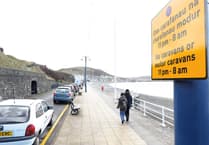What is Hywel Dda health board playing at?
In October 2021 it was told by the Welsh government to set up early-warning clinics for patients suspected of having cancer and, crucially, to guarantee equality of access regardless of where people live.
But, 17 months later, it has failed dismally to deliver on that instruction. In that time, just one of the innovative and life-saving rapid diagnosis clinics (RDCs) has been set up – at Prince Philip Hospital, Llanelli, more than 60 miles from Aberystwyth and much further than that from numerous other towns and villages north and east.
Any claim to equity of access is therefore a nonsense. Even if you’ve got a car, the journey could easily take two hours and cost about £30 for fuel there and back. By bus would take about four hours each way, by train more than six hours.
Patients depending on public transport would thus realistically be unable to get to Llanelli and back in a day, taking into account time at Prince Philip Hospital.
Yet both the health board and the government claim that patients needing to be seen at an RDC will not be disadvantaged because of where they live. That claim is clearly false.
They guaranteed absolute equity of access. That hasn’t happened and, even now, there is no sign that it ever will. Yep, this is just one of the latest grim and rather shocking illustrations of the long-term sheer neglect of NHS patients in mid Wales, stretching back for more than 50 years, outlined in this column a fortnight ago.
Yet the importance of RDCs in offering swift and accurate analysis of the conditions of patients with symptoms that may, or may not, point to serious or life-threatening conditions can hardly be exaggerated.
The clinics fast-track patients with vague but worrying symptoms that could be cancer. They sweep aside old, slower systems under which patients may be referred to several different services before getting a diagnosis, with GPs sometimes sensing that something is wrong but being unable, for weeks or months, to pinpoint what it is.
By contrast, at the end of a single day at a rapid diagnosis clinic, patients will get results of tests and a likely diagnosis, together with a referral to a specialist, a plan for more tests or reassurance if results are normal.
The advantages are obvious. Patients who are not seriously ill are enlightened about the fact far more quickly and so avoid long periods of worry and perhaps unnecessary tests and investigations. Others will get consultant-led referrals far quicker.
In October 2021, when the Llanelli clinic opened, Hywel Dda health board announced: “The plan is to develop further RDCs at sites across the health board.”
Last week it told me: “We are scoping the possibility of setting up another clinic, though this is work in progress currently.”
In other words, after 17 months they’ve got absolutely nowhere.
Where, I asked, would this other clinic be? Surely, after that length of time the picture must be clearer?
Will a clinic be set up in Ceredigion?
And does the board not recognise the stress, inconvenience, time and cost imposed on patients from, for example, north Ceredigion in getting to Llanelli?
Has it any conception of the near impossibility of getting from there to Llanelli by public transport?
The board’s reply? Essentially, just more waffle: “The health board is exploring opportunities for similar clinics across Carmarthenshire, Ceredigion and Pembrokeshire…” But that’s exactly what it was saying in October 2021.
The board’s revelatory statement then takes on a vacuousness almost beyond belief.
In the meantime, it says, “please be reassured that patient access to our services is of paramount importance and is given serious consideration in our planning processes.”
This must mean that the health board has “seriously considered” how very difficult, perhaps impossible, it is for patients in, say, rural Ceredigion and who are on low incomes to get to south Wales and back in a day, and how such patients are simply unable to contemplate the cost of overnight accommodation, and who are therefore excluded from accessing the potentially life-saving services of a rapid diagnosis clinic.
We have to conclude that the board has seriously considered people in such a predicament and has decided not to do a damn thing about it.
At least Betsi Cadwaladr is doing slightly better
Betsi Cadwaladr health board has done far better over RDCs, setting up clinics at its three district general hospitals – at Bangor, Rhyl and Wrexham.
But distances to be travelled by patients in southern Gwynedd are nevertheless very lengthy, with public transport connections to Bangor from towns including Dolgellau, Pwllheli and Tywyn taking many hours.
£6,000 bonus payment to senior Aber Uni staff
It would be indefensible at any time for Aberystwyth University to be shelling out bonuses to its highest earners when those same people are already getting £100,000 or more a year.
But to be doing so when the university’s low and lowest-paid find themselves with no choice but to strike and take to the streets to broadcast their struggle for realistic pay and better conditions is highly insensitive.
According to the university, extra payments made to staff “in recognition and reward of exceptional contribution during the year in question totalled £240,000. Of this amount, £6,000 was paid to senior staff…” That’s at least £6,000 too much.



